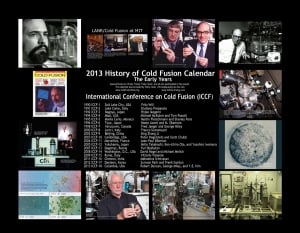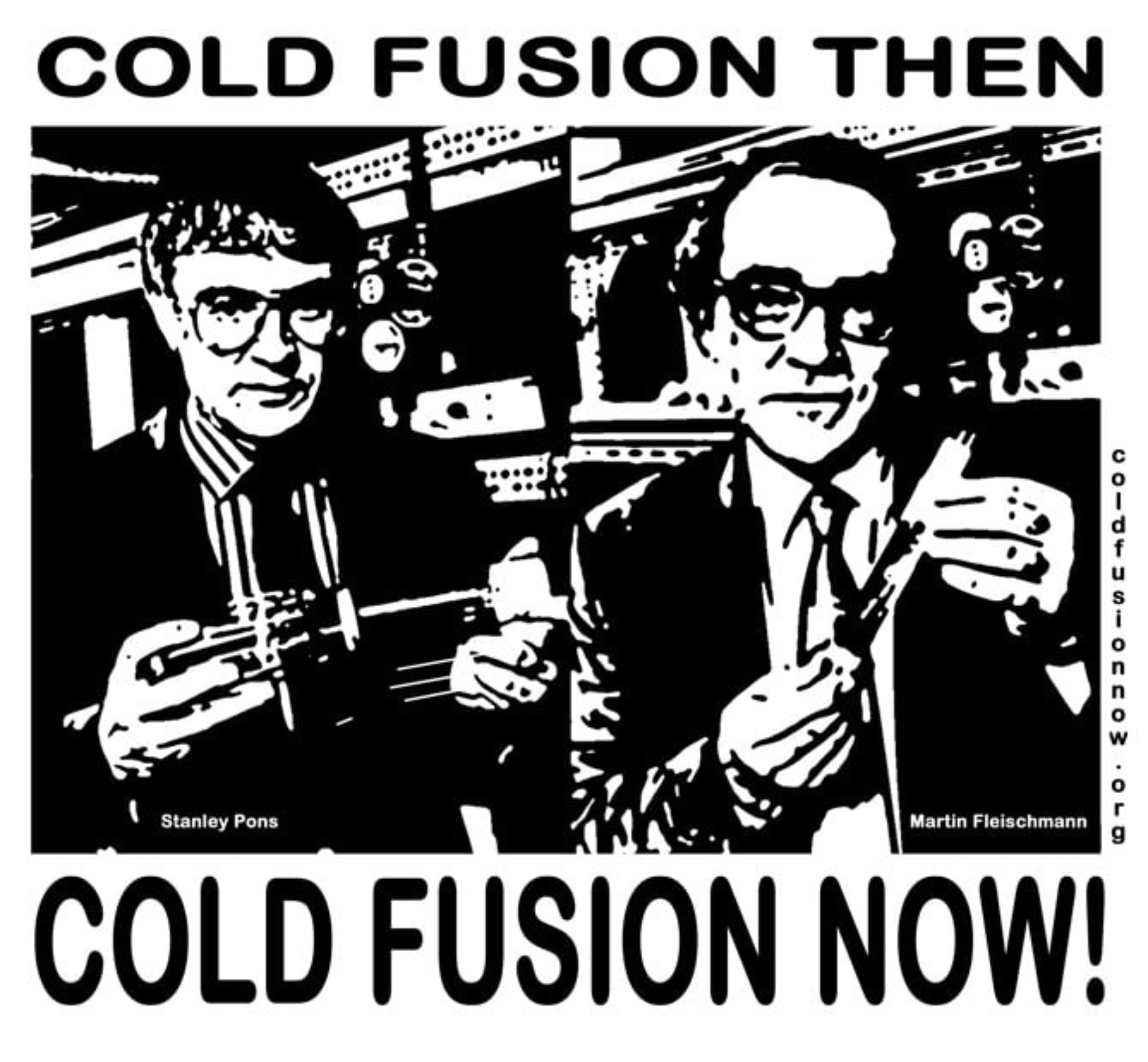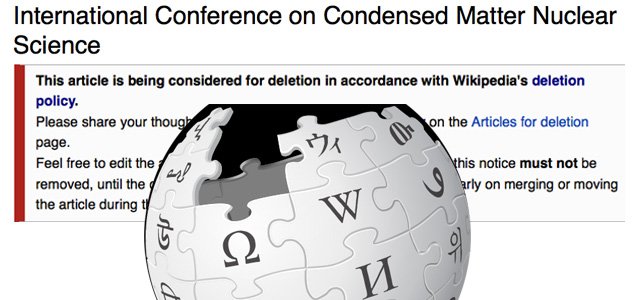The Wikipedia page for the International Conference of Condensed Matter Nuclear Science (CMNS) is being considered for deletion “in accordance with Wikipedia’s deletion policy.”
Generally called the International Conference on Cold Fusion (ICCF), the apparent violation includes designation as a “Fringe topic with insufficient coverage in mainstream sources to establish notability“.
In Wikispeak, the article fails the “General notability guideline“, i.e.:
If a topic has received significant coverage in reliable sources that are independent of the subject, it is presumed to satisfy the inclusion criteria for a stand-alone article or stand-alone list.
According to Wikipedia, the article also fails for “Primary, secondary and tertiary sources“:
Wikipedia articles should be based on reliable, published secondary sources and, to a lesser extent, on tertiary sources. Secondary or tertiary sources are needed to establish the topic’s notability and to avoid novel interpretations of primary sources, though primary sources are permitted if used carefully. All interpretive claims, analyses, or synthetic claims about primary sources must be referenced to a secondary source, rather than to an original analysis of the primary-source material by Wikipedia editors.
While we find the article poorly written (focusing on the word “crackpot” one too many times), the article does not meet the deletion criteria above.
High level research more than notable
Cold fusion is an umbrella term utilized to denote the science surrounding the Fleischmann-Pons Effect (FPE) of excess heat generated from metal-hydrides, as well as the multitude of transmutation effects.

To find an answer, workshops have been conducted by every branch of the U.S. military, with the Naval Research Lab (NRL) scheduled to present results of their decades-long program at the next ICCF-18 meeting to be held at the University of Missouri, Columbia, Missouri. The NRL’s David Kidwell will deliver a keynote speech on the opening day.
Sharing that opening address will be the CEO of a multi-billion dollar scientific equipment and software company, National Instruments. James Truchard will speak on the role his firm will play in developing both the science and technology.
The Defense Threat Reduction Agency (DTRA), the Defense Advanced Research Projects Agency (DARPA) and the Electric Power Research Institute (EPRI) have seen fit to fund SRI International’s science program, among other programs. EPRI sponsored the proceedings of ICCF-4.
Low-energy nuclear reaction (LENR) research has been taken seriously by NASA, who have been the most vocal of U.S. agencies in advocating for increased attention and funding, given the huge ramifications for space exploration and society as a whole.
Open-source projects like the Martin Fleischmann Memorial Project have produced a coalition of citizen scientists and nuclear physicists across borders through international cooperation.
The American Nuclear Society and American Chemistry Society are but a few of the entities around the world working to provide answers in condensed matter nuclear science.
The service environment for a new economy is building around small independent start-ups seeking to produce a commercial product.
Is not this list not notable?
Secondary sources provided by federal government’s collection
For years, Wikipedia has unreasonably targeted cold fusion, low-energy nuclear reaction (LENR), lattice-assisted nuclear reaction (LANR), chemically-assisted nuclear reaction (CANR), Fleischmann-Pons Effect (FPE), the anomalous heat effect (AHE), quantum fusion, low-energy nuclear transmutation (LENT), and Hydrogen energy nuclei interactions (HENI).
Abd ul-Rahman Lomax knows a bit about that, as he was one Wikipedian editor who advocated to keep the topic justly-treated, and was banned for his efforts. Now he seeks to develop a ‘cold fusion kit’ that would be available for the public to reproduce the experiment. Lomax provided the experimental set-up used by high-school student Eric Golab in The Believers movie.
For over two-decades, CMNS papers appeared only on community websites, such as the International Society of Condensed Matter Nuclear Science library or author Jed Rothwell‘s lenr-canr.org.
Now, these papers find themselves in the federal stores at science.gov (search LENR). From the website:
Science.gov is an interagency initiative of 17 U.S. government science organizations within 13 Federal Agencies. These agencies form the voluntary Science.gov Alliance which governs Science.gov. – About
Even the U.S. Department of Energy (DoE), who does not yet officially acknowledge the existence of the anomalous phenomenon, has a database of papers at scienceaccelerator.gov (search LENR) whose list of citations includes many papers from ICCF proceedings themselves:
Science Accelerator is a gateway to science, including R&D results, project descriptions, accomplishments, and more, via resources from the Office of Scientific and Technical Information (OSTI), U.S. Department of Energy. – About
Thanks and credit go to Paul Maher for keeping tabs on the federal information banks, and watching the evolution of their fare. They show secondary sources on a science that is decidedly not fringe.
We suggest screen shots of Wikipedia’s page. There will come a day when the Wikipedia article on Wikipedia will need a good dose of historical fact.
Related
ICCF Wikipedia article up for deletion Lenr-forum
LENR Conference Proceedings New Energy Times


that’s incredible.
Based on the fact that mainstream press don’t talk of LENR, that it is banned from Science recognition, Wikipedia can apply that stupid rule.
It is righ that only information from ICCF come from people who support ICCF.
National Instrument is not independent, but sponsor.
Uni Missouri is host.
LENR-CANR is banned site, like NET…
they apply their laws like a VoPo at Berlin wall the day before it was open.
Let me see if I have got this straight.
In order for a subject to be included in Wikipaedia it must first get the nod from those who stand to gain from it’s deletion?
That sounds about right.
Come closer to the screen homo self-styled, “sapiens”.
You are headed for extinction.
Do you know what that means? It means no more TV. No more beer. No more football. Don’t worry, you won’t miss it.
That is the upside of extinction.
Extinction is your little reward for profound stupidity.
“Ehh….What’s up doc?”
“Shhh. Be vewy vewy quiet, I’m hunting LENW”
The way they work to get things deleted is that they will first delete sourced parts of the body because some arbitrary policy, like “undue weight”, or just by calling “fringe”. Then when the article is deprived of all the good sources, they will claim “no good sources” and call for delete.
Anyone who wants to build the good sources back in, is branded as POV pusher and will get banned as soon as a suitable opportunity arises.
good sources that mention the ICCF are:
* http://www.wired.co.uk/news/archive/2012-09/14/cold-fusion
* http://www.forbes.com/sites/markgibbs/2012/08/04/the-state-of-the-cold-fusion-market/2/
* the ICCF is mentioned in the Nuclear Energy Encyclopedia published by
Wiley.
* http://www.wired.com/wired/archive/6.11/coldfusion_pr.html
* http://www.thehindu.com/sci-tech/technology/call-for-interdisciplinary-studies-in-cold-fusion/article1165494.ece
* http://www.popsci.com/science/article/2012-10/andrea-rossis-black-box
I posted the articles Wikipedia Beyond Cold Fusion…
to show that other research “beyond the standard model” physics
are not a battleground of contention as is the Wiki Cold Fusion article.
An anomalous amount of energy is being spent discrediting this research.
Anonymous is invited to get to the roots of the unknown entities causing this contention.
while my other comment with sources is still in moderation, here is an article in scientific american mentioning the ICCF “Back to Square one” by Charles Q. Choi http://www.scientificamerican.com/article.cfm?id=back-to-square-one
Wikipedia tends to lack editors who are both knowledgeable on the topic of cold fusion and knowledgeable about Wikipedia policies.
Editors who were both, were banned. Pcarbonn was explicitly banned as a “Civil POV-pusher.” I.e., a “POV-pusher” who follows policies. The cold fusion article came to be under continuous attention by a faction of editors more centrally associated with what might be called “MPOV,” majority point of view, particularly with respect to science. This, in fact, violates Wikipedia policy, which does not have a majority POV standard. Rather, the standard for inclusion in Wikipedia is coverage by independent reliable sources, and “reliable source” doesn’t necessarily mean “mainstream,” rather *independence* is the standard. A non-mainstream view should never be presented as if it were mainstream, but there is no clear definition of “mainstream.” For science articles, the Arbitration Committee ruled that peer-reviewed secondary sources (reviews) in “mainstream journals” and academic publications would be golden. Yet the faction mentioned consistently applied a different standard, to the extent that an explicit review in a major mainstream multidisciplinary journal, Storms’ “Status of cold fusion (2010)” was rejected by these editors– though accepted as reliable source by the Reliable Source Noticeboard (WP:RSN). They argued “fringe author,” a standard they entirely invented. It’s totally circular, all designed to maintain the status quo by a set of long-term and generally ignorant editors. Including a few administrators. If not for them, that faction would have been long ago banned. A number of administrators lost their priveleges over this, the administrator who banned me from Cold fusion was desysopped. The one who banned Jed Rothwell was reprimanded over his actions, but … Wikipedia has no reliable enforcement structures. That Rothwell banner simply laid low for a while, then went right back to what he’d been doing before.
So, this case. There is *plenty* of independent reliable source covering the ICCF. It’s covered by skeptics, derisively. Some of that is reliable source by the Wikipedia standards. But these sources are not in the article. It was not written by someone knowledgeable about both Wikipedia requirements and the ICCF and the literature about it.
Looking at the article itself, as it is today, I see plenty of non-reliable sources cited for information. Kowalski, for example, is self-published. If notability of the Conference is established, as can be done from the many solid reliable source references available, it becomes possible to use more marginal sources through editorial consensus. Every weak source used in the article increases the likelihood, while it is under consideration for deletion, of !votes to delete. That’s just the politics of it.
Looking at the references, I see *lots* of nonreliable source references. Self-published material. New Energy Times, which is *not* considered RS generally. It’s like a blog, essentially one man’s opinions. It is not independent from the field. There are reliable sources, but most appear to be passing mention. That does not establish notability. The Conference itself must be covered, not just mentioned. Simon (Undead Science) is good, see page 127 for substantial coverage, plus ICCF in the index.
Huizenga covers the first two or three conferences.. Park (Voodoo Science) does, see page 12-14, and those are both academic publications. There are, I’m sure, *many* newspaper articles covering the conferences, but those are not likely to be central.
As matters stand at the moment, a neutral administrator would possibly decide “no consensus.” Then, after some decent delay, they could try again.
The arguments of “fringe” are irrelevant. Fringe topics can be notable. The issue is coverage in reliable source. However, at this point the great majority of references in the article are to marginal or unusable sources. Infinite Energy is not considered a reliable source.
One device to preserve an article against a deletion attempt is to “stub it,” to what is *solidly* sourced. Remember, it’s all in history. (If the article is deleted, the history will only be visible to administrators.) However, this might be resisted by the pro-ICCF editors!
Looking at the Talk page, I see editors who are essentially clueless trying to figure out what to do. Nowa finds a reference to ICCF-10. Doesn’t cover the conference *at all*, just mentions it. And finds a blog post by Haiko Letz, a cold fusion scientist. No, no!!!!
And then Nowa is ready to agree to a merge, thinking there isn’t enough RS for an article. What’s happened is that independent article after article have been so merged, so that the cold fusion article is *bloated* with everything and the kitchen sink, and most of it then, later, gets trimmed out. No, there is *independent coverage* of ICCF, enough for a stub and then for a bit more flesh. *Once notability is established* an organization’s information about itself *can be used,* judiciously and with consensus.
Then Alan777 suggests a subpage for ICCF. He hasn’t noticed that subpages *are not allowed* in Wikipedia mainspace, a structural decision made early on, it’s a flat encyclopedia.
Inexperienced Wikipedia editors read the guidelines and form a superficial understanding of them, without having broad experience at actual application. When these editors argue extensively in an AfD, it shows up to experienced editors, and most of those who watch AfDs are experienced, and administrators are experienced, like a sore thumb. Just remember this: every time a defective argument is presented, it weakens the overall case. It can bury the real issues in noise, and then an administrator, tired of the endless argument, acts to end the mess. Often they will go for delete, just to stop the arguments. After all, the administrator might think, “These people are just going to go away if we delete. They won’t know about WP:DRV and other process. They are just POV-pushers, anyway. Wasn’t cold fusion conclusively rejected more than twenty years ago?”
That is why a stub can defeat the deletion effort, showing clearly notability, with no other issues. That is why skeptical coverage can be so useful, and why Simon, who really does cover ICCF extensively, is so important.
As to the AfD discussion, we see a few names over and over. Nowa and Edcolins clearly are clueless. The nominator is over-participating, my opinion, but … he’s hammering on one point, and it is the real point. Nowa and Edcolins don’t understand him, and any experience adminstrator will see this immediately. Enric Naval votes Delete, totally predictable.
“There is not much coverage of the conference itself outside of books that specialize in cold fusion.” What does he expect, coverage in books on astronomy? There are plenty of reliable sources covering cold fusion, which cover the conference itself. That argument of Naval’s is utterly irrelevant, but he’s been sitting on the cold fusion article for years, and he reveals his POV fantasies in his comments. Really, this is how pseudoskeptics like him think. They make up a story, believe it is the truth, and then interpret everything through that set of colored lenses. And then Naval cheerfully supported the banning of any editor who disagreed with him. He *also* disagreed with the express position of the Arbitration Committee in the Fringe Science arbitration, but Wikipedia only notices POV-pushing, when push comes to shove, when an administrator disagrees with the alleged POV pusher,.because of his (almost always male) own POV.
I truly gave up on Wikipedia as Not Ready for Prime Time. An endless opportunity to push a boulder up a mountain. I’d spend *weeks* to get some change made, and then it’s all made moot by the flood of events.
I managed to get links to Fleischmann’s ICCF paper explaining what he was looking for, in his biography. (Special exception to general rules about conference papers: a notable author talking about himself, cited as such). First I had to get the page whitelisted, because all links to lenr-canr.org had been blacklistted. That action was found improper, but because of WikiMedia arcanities, the site remained blacklisted. And then that wacko administrator took it out. Repeatedly. I handled it with a careful negotiation on the Talk page. Massive discussion, covering *all the objections.* An arbitrator even showed up and participated. Consensus: link allowed. A *huge effort* for one link. That one, because of all that effort, and in spite of some efforts by the “faction” to remove it, remained, and it’s still there. But whenever similar issues came up, elsewhere, the *same rejected arguments* would be raised. I eventually got lenr-canr taken off the blacklist, and was *banned* exactly for that *successful* effort. Too many words, it was said. That was not even on Wikipedia! (It was a global blacklist, maintained on the meta wiki, operated by the Old Boy Network. Which I was helping to dismantle….)
The same arguments are being raised in this AfD, mixed with legitimate arguments (really, some very poor sources are being insisted upon. Kowalski is a great guy, but he is *not* an “independent source,” he is self-published, and that, right there, blows the usage of Kowalski out of the water.)
Why should I continue my donations to Wikipedia when they ignore the reality of ICCF scientific meetings and “Cold Fusion”/LENR research? Doesn’t the opinion of the US Patent Office matter? Dr. Patterson has many patents granted related to his “Cold Fusion” work, the latest.7,556,783, Granted on July 7, 2009. Is Dr. George Miley’s work to be ignored as well, specifically, US Patents 8,440,165 Granted May 14, 2013 and 8,227,020 Granted July 24, 2012? Should we just go back to the unscientific Middle Ages and ignore the reality of 2013?